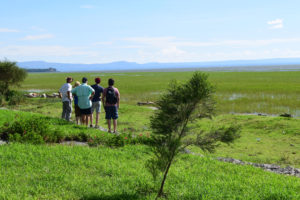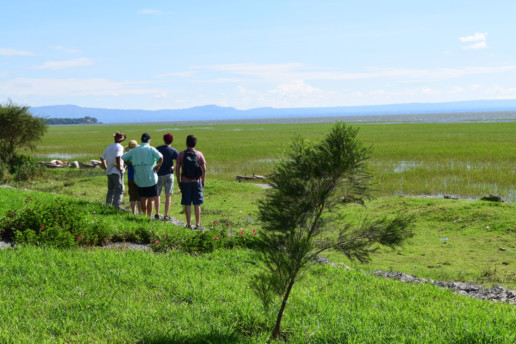National Maternal Mortality rate has been cut in half!

We have had some wonderful success stories as well with the delivery of one mother six weeks early who also had preeclampsia but has gone home with a live baby. Dr. Ross has been a Godsend to us. We also have a new GP, named Dr. Sifora. She has spent the past month with me in OB and has been a wonderful asset to me. She is a recent graduate of medical school in the Philippines and would like to become an OB/GYN in the future. Dr. Sheryl Ross has her PhD in leadership and has been giving leadership training to our nursing, administration and chaplain staff.
We are very grateful that Dr. Nate Ross, an OB/GYN from Alabama, and his wife Sheryl are spending this month helping us out.
You know you’re a missionary in Africa when . . .
 We’re guessing that some of you reading this were probably fans of the Late Show with David Lettermen. Each Late Show would end with a goofy “top ten” list (“Ten Reasons that Captain Kangaroo should be president of the United St.ates, that sort of thing). As part of our newsletter today, we’ve decided to do our own top ten list. Well, actually it’s a top eight list, because we felt like ten was a little too long-winded. So today we proudly present to you “Eight Ways to Know You’re A Missionary in Africa.”
We’re guessing that some of you reading this were probably fans of the Late Show with David Lettermen. Each Late Show would end with a goofy “top ten” list (“Ten Reasons that Captain Kangaroo should be president of the United St.ates, that sort of thing). As part of our newsletter today, we’ve decided to do our own top ten list. Well, actually it’s a top eight list, because we felt like ten was a little too long-winded. So today we proudly present to you “Eight Ways to Know You’re A Missionary in Africa.”
We find humor, beauty and faith-building in everything you’re about to read on this list. We hope that it gives you, our faithful friends and supporters, a little bit of a behind-the-scenes peek into what life is like on the African mission field.
And now without further adieu, you know you’re a missionary in Africa when:
De-worming isn’t just for your dog. It’s true! Twice a year, every member of the Canfield family takes a yummy little pill that kills off any “friends” our intestines might have picked up (the pill has no side effects). Thankfully, the medicine has worked and we haven’t had any unwanted stomach visitors yet. But worms in Ethiopia are fairly easy to get from fruit and contaminated food. So the next time you pick up worm medicine for your pet, you think can think of us.
Potato chips are one of your most valued treasures. We won’t lie – when we lived in the US, Trader Joe’s potato chips were one of our favorites. No Trader Joe’s here. Sometimes at one of the tiny local stores here we can find a brand of chips called Mr. Potato. They’re basically the African version of Pringles chips, complete in a tall, slender can. When we do find a can of these, the celebration that follows would make you think we just won the lottery. But no, we’re just really excited about a bit of highly processed fat and salt.
Candles aren’t decorations. The power goes out here. A lot. Usually a few times a day. Our longest stretch with no power was four months, as we shared in our last newsletter. So we’ve gotten used to eating, reading,washing dishes, etc. by the light of candles. We were so blessed to have one of our friends and supporters in Oregon send us a gift of a new portable generator for our house. We can get gas to run it a few hours a day during the bad power outages. But our eyes have developed a somewhat cat-like ability to see in the dark.
Your definition of “clean” changes (dramatically). Between power outages and water shortages, showers can be a rarity, especially during the dry season. Jackson and Oliver actually love this, as they’ve never been really big big fans of bathing.
Bugs and reptiles in your house don’t bother you. The variety of animals in Africa is absolutely stunning. There are so many small creatures here that look like they stepped out of a psychedelic dream. The catch is that many of them crawl, fly or slither into our house on a regular basis. It’s not uncommon to grab a dish off the shelf and find a striped lizard sleeping underneath. Or to step out of bed in the morning and disturb a horned beetle slowly making its way across the floor. There’s no way to keep them out, so for the most part we just laugh and admire them (although Brad was not a fan of the black tarantula in our kitchen).
Your morning commute involves dodging donkeys. There’s nothing like traffic in Africa. It’s perhaps comparable to driving through a massive, out-of-control circus – fascinating, amusing and sometimes alarming. Every time we drive from our house to the hospital, we swerve around packs of donkeys (far more numerous than cars), chickens, goats, three-wheeled bajaj taxis, and oceans of people. We praise God after every drive that we didn’t hit anyone or anything.
You take “coffee snob” to a whole new level. In our biased opinion, east Africa produces the best coffee in the world, and Ethiopia is known as the birthplace of coffee. Back in our home state of Oregon, there’s a coffee shop called Stumptown is that at the epi-center of the “coffee snob” culture. The kind of place where people in plaid shirts sit around sipping $10 cups of joe and commenting about “floral notes.” Well, the folks at Stumptown can only dream of sitting on a terrace overlooking the mountains of Ethiopia, drinking coffee that was grown and roasted about a mile down the road on a small farm, and slow-brewed in a jebena pot over a coal fire. The scenes that you see on the big posters in Starbucks, we get to live every day. What can we say, we’re proud of our adopted country!
You believe in miracles, because you see them happen all the time. As Christians living in the US, it was often easy for us to give lip-service to the idea that God works miracles, without fully believing it in our hearts. The blessings of modern medicine and the relative security of living in America often made super-natural intervention in our lives seem unnecessary. It’s different in Ethiopia. Miracles are how people survive here. There’s no rain for months for crops; so the people in our city hold an all-night prayer meeting, and the next day it pours (and the next and the next). Patients come to Soddo Christian Hospital with medical problems that should mean death, with conditions that should be incurable. Our staff pray for them (and also provide great care), and the patients walk out of the hospital healthy. Mysterious, massive tumors disappear. Horrible diseases evaporate into thin air. It’s easy to discount the supernatural when you don’t really need it. Our perspectives have been changed because we do need it. Every day.
Post by: Brad Canfield

